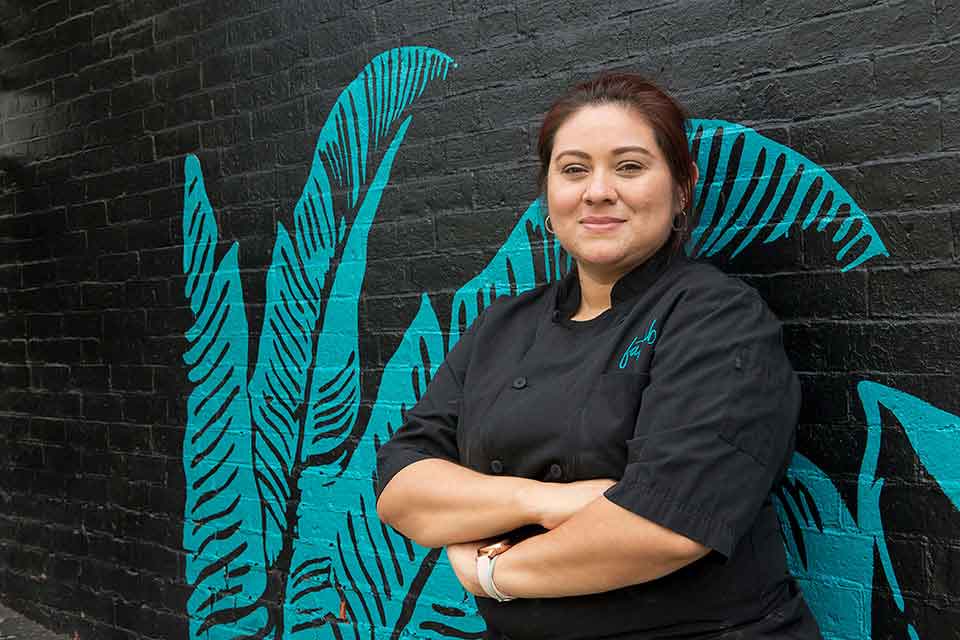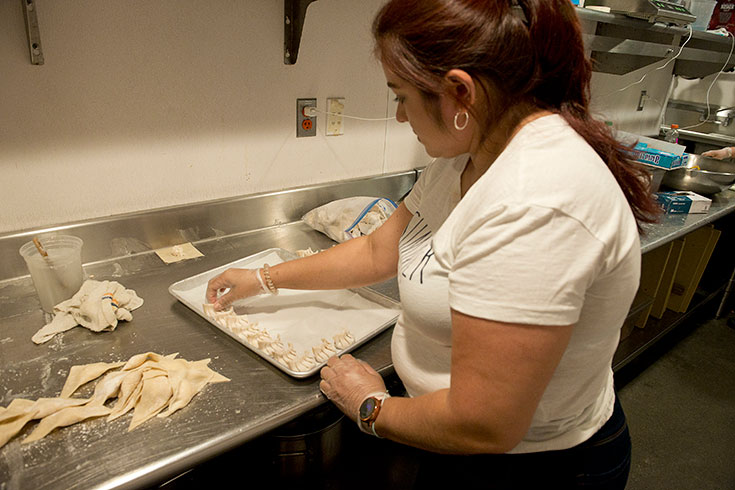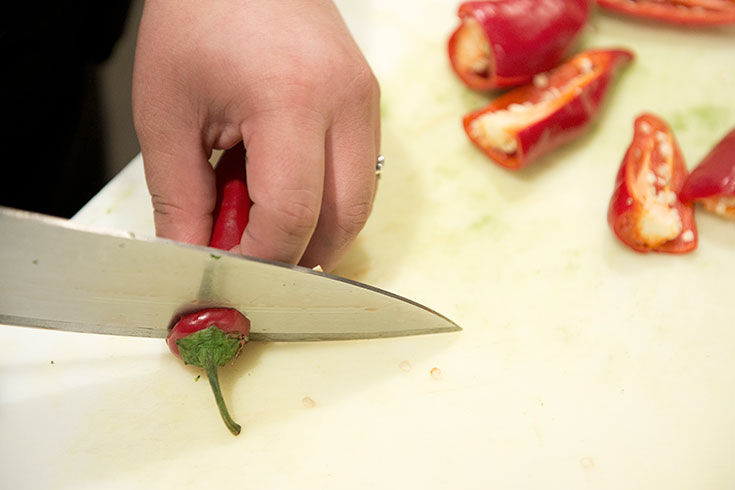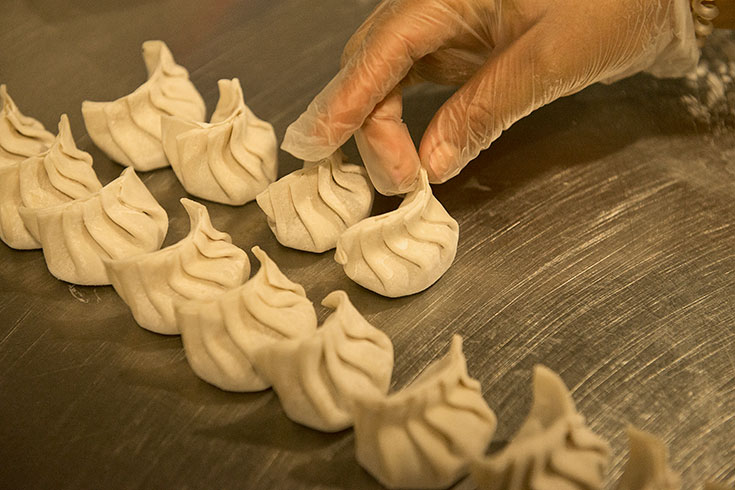Mayra: There, one can die still dreaming

Mayra is a 32-year old Latinx woman from El Salvador who came to the U.S. when she was 25 to join her boyfriend. She lives in Boston and works in food preparation at a restaurant.
Photo Credit: Sarah Putnam (all photos)
Born in a small town in El Salvador, Mayra grew up in a small adobe hut with no modern facilities. “The house had a dirt floor. There was no running water, electricity or bathroom.” Her mother, who had lost her parents as a young child, struggled to get by. She had Mayra when she was sixteen, after a relationship with an older man in the village who soon abandoned her.
 Soon after Mayra was born, her mother met the man who was to become Mayra’s stepfather and the father of Mayra’s two younger half siblings. Mayra lived in fear of her stepfather, and helplessly watched as he terrorized her mother. She and her younger siblings were also the target of his drunken bouts of rage. “He was a mean, mean person, a drunk who beat my mom. He threatened to kill her. I remember one time he punched her and then kicked and threw my seven-year old brother against the wall.”
Soon after Mayra was born, her mother met the man who was to become Mayra’s stepfather and the father of Mayra’s two younger half siblings. Mayra lived in fear of her stepfather, and helplessly watched as he terrorized her mother. She and her younger siblings were also the target of his drunken bouts of rage. “He was a mean, mean person, a drunk who beat my mom. He threatened to kill her. I remember one time he punched her and then kicked and threw my seven-year old brother against the wall.”
As the abuse escalated, Mayra’s mother fled. She was now on her own with three young children, struggling to put food on the table. To make money, she took cleaning and laundry jobs for well-off families in the area. Nine-year old Mayra, a bright and inquisitive third grader, had to drop out of school to take care of her younger brother and infant sister while her mother went out to work.
In her teenage years, Mayra searched for ways to supplement her mother’s meager income. She went through a string of difficult and poorly paid jobs in housecleaning and food service. Eventually, she found a job at a factory owned by Fruit of the Loom, a U.S. company with manufacturing plants around the world, mostly in countries where the cost of labor was low. Mayra worked on the assembly line producing underwear and t-shirts for export to other countries.
At the factory, Mayra grew frustrated with the low wages she was paid and the dismal working conditions. Management docked pay for the slightest infractions and gave no breaks for eating, getting water or going to the bathroom. Though many of these management practices were unlawful, government officials did nothing to enforce the laws protecting workers. “There is so much corruption. The government in El Salvador lets the international companies come in to the country and do whatever they want. The politicians get money under the table from the factory owners to keep quiet and ignore how badly they treat the workers.”
 Mayra met her boyfriend when she was still living in El Salvador. He was also from El Salvador but living and working in the U.S. He and Mayra met on Facebook through mutual friends. After a year of exchanging messages and chatting with each other, he promised to come and see her in person on his next visit to El Salvador. He kept his promise and when they finally did meet, they knew they wanted to be together.
Mayra met her boyfriend when she was still living in El Salvador. He was also from El Salvador but living and working in the U.S. He and Mayra met on Facebook through mutual friends. After a year of exchanging messages and chatting with each other, he promised to come and see her in person on his next visit to El Salvador. He kept his promise and when they finally did meet, they knew they wanted to be together.
Mayra’s boyfriend asked her if she wanted to come with him to the U.S. She was initially reluctant, anxious about leaving her mother behind and not being there for her. Soon, however, she realized that she could better support her mother financially from the U.S., sending her money to pay for the medicines and other things she needed. She also hoped to ensure that both of her younger siblings would be able to complete high school, a goal she wished she had been able to achieve herself. Mayra made the decision to leave.
Mayra arrived in Boston and moved in with her boyfriend who lived with his two sisters and a friend. The first few years were difficult. Mayra missed her family and friends and felt frustrated by her inability to speak English. She had enrolled in an English as a Second Language class that met once a week for two hours but she felt discouraged about her progress. She began working immediately for a cleaning company servicing office buildings.
Mayra’s next job was at a café where she was put to work making salads and sandwiches. She found that she enjoyed the tasks and started to think about how she could grow her skills in food preparation. She moved on to a large restaurant where she worked as a dishwasher for a couple of months and then as an assistant in the pastry section. For three years, she thrived in this position, supported by her co-workers. “The chef taught me how to prepare the ingredients, to look at recipes, and to make the pastry exactly right. My co-worker in the pastry section was a sweetheart. Since the recipes were in English, she explained everything to me. I started learning more English from talking to her and looking at the recipes. I proved to myself and everyone around me that I could do it.”
Mayra describes the onset of the pandemic in 2020 as the worst year of her life. It was a time when she questioned whether she had made the right decision to come to the U.S. and leave her family behind. Mayra received the devastating news that her younger brother, with whom she had a close relationship, had passed away. She was heartbroken and longed to be with her mother and sister in El Salvador during this time of grief. Then, the restaurant where she worked closed down in response to the pandemic.
 In the months that followed, Mayra used up what little savings she had. Fortunately, her boyfriend’s job remained stable and he was able to pay most of the rent at this time. Putting her pastry skills to work, Mayra began to experiment with making hot cocoa bombs at home to sell, but it was difficult to find customers. She also dove into online English language classes, which eased her sense of isolation and distracted her mind from worries. “I think that what really helped me, really a lot, to survive this pandemic and then also at the same time losing my brother, what helped me to not go crazy were my English classes. I have to say that my English classes saved me, that’s the truth. If I hadn’t had my classes, who knows what would have happened to me, because I just felt so lonely.”
In the months that followed, Mayra used up what little savings she had. Fortunately, her boyfriend’s job remained stable and he was able to pay most of the rent at this time. Putting her pastry skills to work, Mayra began to experiment with making hot cocoa bombs at home to sell, but it was difficult to find customers. She also dove into online English language classes, which eased her sense of isolation and distracted her mind from worries. “I think that what really helped me, really a lot, to survive this pandemic and then also at the same time losing my brother, what helped me to not go crazy were my English classes. I have to say that my English classes saved me, that’s the truth. If I hadn’t had my classes, who knows what would have happened to me, because I just felt so lonely.”
In the summer of 2021, restaurants began to open up. While her former place of employment was still not hiring back workers, Mayra was able to find work at a Japanese restaurant. Mayra is hoping to rebuild her financial stability, as well as to continue to support her mother back home in El Salvador. Mayra was excited that, after a year of English classes, she was able to interview for the job in English. She also liked the prospect of expanding her cooking skills and learning to prepare Asian foods such as dumplings, ramen and even sushi. She is someone who loves learning new things.
Looking back on her decision to come to the U.S., Mayra knows that it was the right thing to do. Despite the heartache of being away from her family, the move has enabled her to provide them with much-needed financial support. She is optimistic about her own future and the opportunities available to her. “I love this country so much. I have opportunities here that I don’t have in El Salvador. There, one can die still dreaming because no matter how much you try, you’ll never achieve what you want.”